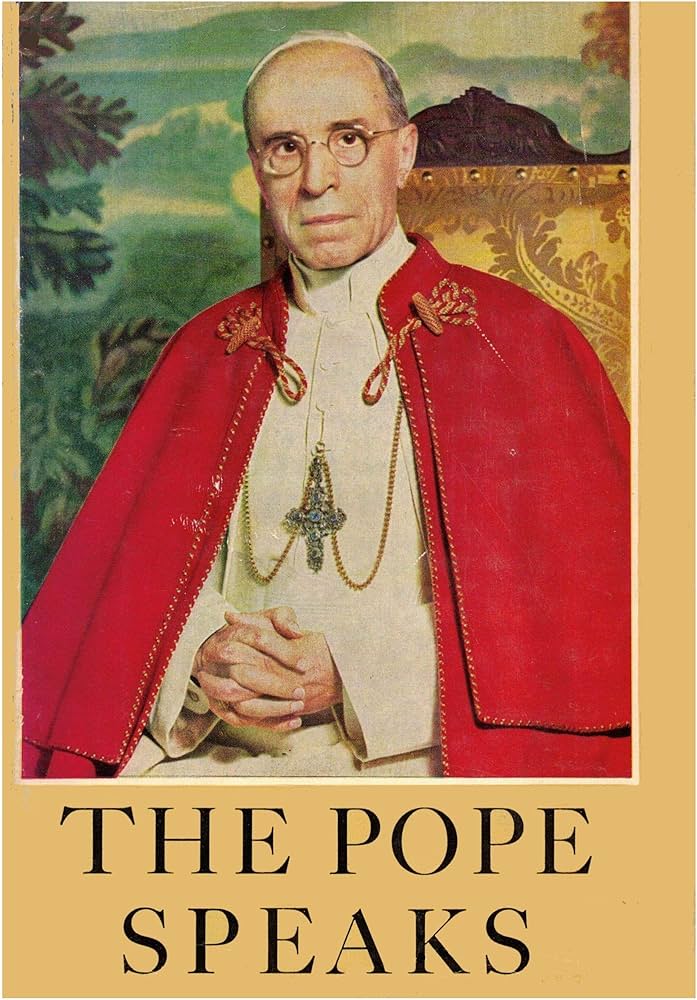Michael Chinigo, The Teachings of Pope Pius XII (1958)
While Popes are obviously not chosen for their political views, how they interpret Catholic theology can have profound political implications for the faithful and therefore the broader Australian polity. Historically, Popes have tended to take something of a middle ground, critiquing both socialism and the excesses of capitalism. Although because Australia’s Catholics have often been associated with the Labor Party, the former has often caused more consternation.
Pope Leo XIII’s Rerum Novarum papal encyclical was released in 1891, simultaneous with the birth of the ALP. And while it agreed with the labour movement in opposing the exploitation of workers and calling for a farer distribution of wealth, it also denounced socialism in a manner that led to fierce debate as to whether Catholics were compelled to shun the ALP platform – which from 1905 contained an explicit socialist objective.
The theological tradition of Saint Thomas Aquinas is clear in its defence of private property ownership, on the grounds of incentive and personal responsibility, arguing that:
‘Every man is more careful to procure what is for himself alone than that which is common to many or to all: since each one will shirk the labour and leave to another that which concerns the community… Human affairs are conducted in more orderly fashion if each man is charged with taking care of some particular thing himself, whereas there would be confusion if everyone had to look after any one thing indeterminately.’
Hence Catholicism opposes all property being given over to the state in the manner of true socialism. But how this should be applied to the more extreme applications of Labor policy was left somewhat open to interpretation, with Cardinal Francis Moran drawing a distinction between European socialism (which Leo was clearly condemning) and its allegedly milder Australian form. Nevertheless, when Labor went beyond their usual moderation Monsignor Thomas J. O’Donnell of Tasmania, could still give a sermon attacking Ben Chifley’s attempt to nationalise the banks:
‘The Federal Labor Party, unconsciously bent on the destruction of Australian liberty, is forging chains for the limbs of our people … to seize the banks is to seize the property and the rights of hundreds of small shareholders … it would be the first step towards making Australia a totalitarian State and its people slaves.’
Another key Catholic political teaching coming out of the Aquinas tradition is subsidiarity – the idea that political decisions should be made at the most local level which is practicable. During the 1973 Constitutional Convention called by Gough Whitlam, Speaker of the NSW Legislative Assembly Jim Cameron would quote from Pope Pius XI in defence of the role of state governments, in a speech he then sent to Menzies:
‘It is a fundamental principle of social philosophy, fixed and unchangeable, that one should not withdraw from individuals and commit to the community what they can accomplish by their own enterprise and industry. So too, it is an injustice and at the same time a grave evil and a disturbance of right order, to transfer to the larger and higher collectivity, functions which can be performed and provided for by lesser and subordinate bodies.’
But of all the Catholic political teachings, none was more important to the Menzies era than the Church’s unequivocal opposition to godless and materialist communism, which sought to replace faith and family with an all-powerful state. As Pope Pius XII’s Teachings note: ‘We have… condemned and rejected, as the duty of Our office demands, the errors that the upholders of atheistic Communism teach and try to spread’.
You might also like...
Sign up to our newsletter
Sign up for our monthly newsletter to hear the latest news and receive information about upcoming events.


